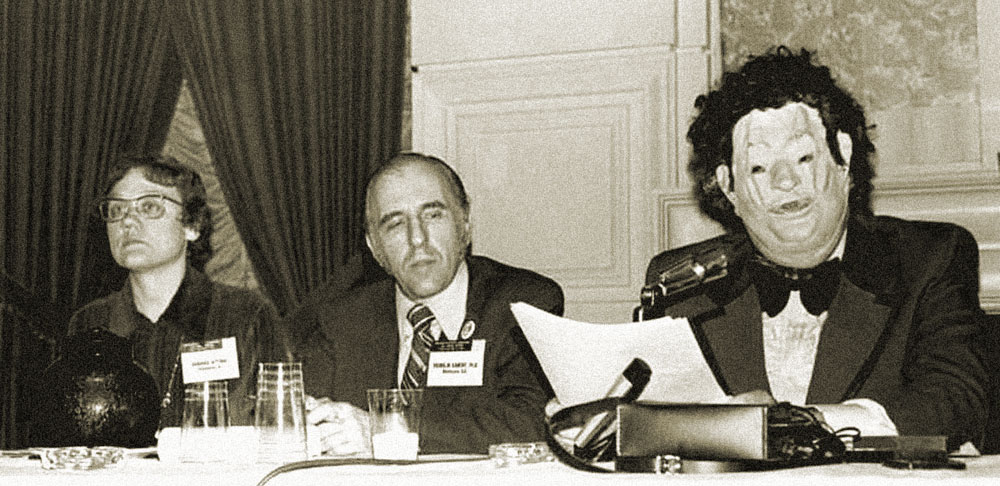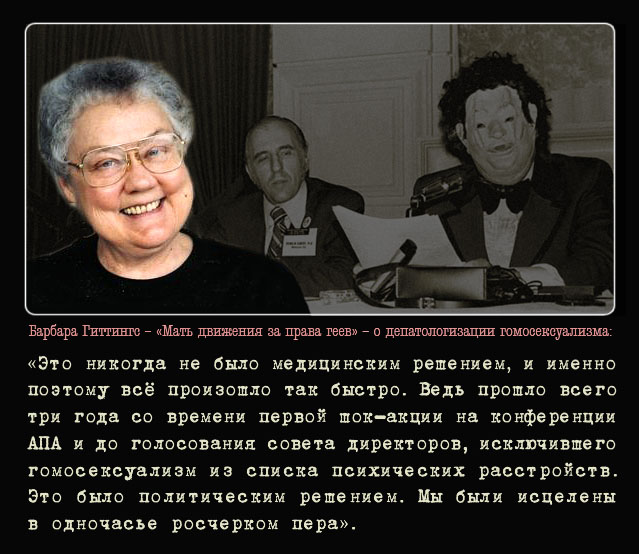Discussion by Irving Bieber and Robert Spitzer
15 December 1973 The Board of Trustees of the American Psychiatric Association, yielding to the continued pressure of militant homosexual groups, approved a change in the official guidelines for psychiatric disorders. “Homosexuality as such,” the trustees voted, should no longer be seen as a “mental disorder”; instead, it should be defined as “violation of sexual orientation”.
Robert Spitzer, M.D., assistant professor of clinical psychiatry at Columbia University and a member of the APA nomenclature committee, and Irving Bieber, M.D., clinical professor of psychiatry at New York College of Medicine and chairman of the study committee on male homosexuality, discussed the APA's decision. What follows is an abridged version of their discussion.
Key points of discussion:
1) Homosexuality per se does not meet the criteria for mental disorder, as it is not necessarily accompanied by distress and generalized disorders of social functioning, but this does not mean that homosexuality is as normal and full-fledged as heterosexuality.
2) All homosexuals have impaired normal heterosexual development due to fears that inhibit the development of sexual function. Homosexuality treats DSM in the same way as frigidity, since frigidity is also a violation of sexual function caused by fear.
3) According to the new definition, only “egodystonic” homosexuals who are unhappy with their condition will be diagnosed. The demarcation between two types of homosexuality, when the most traumatized homosexual is told that he is healthy, and the least traumatized, who retains the potential for restoring his heterosexuality, is told that he is sick - is absurd.
Dr. Spitzer: When approaching the question of whether homosexuality is a mental illness or not, we must have some criteria of mental illness or disorder. According to my proposed criteria, a condition must either regularly cause subjective disorders or be regularly associated with some general impairment of social performance or functioning. It is clear that homosexuality by itself does not meet these requirements: many homosexuals are satisfied with their sexual orientation and do not exhibit any general violations.
If homosexuality does not meet the criteria for a mental disorder, what is it? Descriptively, we can say that this is a form of sexual behavior. However, by not considering homosexuality more as a mental disorder, we are not saying that it is normal or that it is as valuable as heterosexuality. We must admit that in the case of homosexuals who are worried or unhappy with their homosexual feelings, we are dealing with a mental disorder, because there is a subjective disorder.
Dr. Bieber: First of all, let's define the terms and not use “disease” and “disorder” interchangeably. In the popular sense, mental illness means psychosis. I don't think homosexuality is a mental illness in that sense. Regarding civil rights, I fully support all civil rights for homosexuals. Regardless of how a particular sexual adaptation is achieved in an adult, sexual behavior between consenting adults is a private matter.
Our main question is: is homosexuality a normal version of sexuality that develops like left-handedness in some people, or does it represent some kind of sexual development disorder? I have no doubt that every male homosexual goes through the initial stage of heterosexual development first, and that all homosexuals have a disruption in normal heterosexual development due to fears that cause anxiety and inhibit the development of sexual function. Homosexual adaptation is substitutional adaptation.
I would like to give you an analogy. With poliomyelitis, a person receives a number of traumatic reactions. Some children are completely paralyzed and unable to walk. Others can walk with braces, and still others have enough muscles to rehabilitate and walk on their own. In a homosexual adult, heterosexual function is impaired in the same way as walking in a polio victim. The analogy is not the same, just that the trauma from polio is irreversible.
What do we call it? You will argue that this is normal? That a person whose legs were paralyzed by polio is a normal person, although polio is no longer active? The fears that created homosexuality and psychological restraints undoubtedly belong to some kind of psychiatric designation.
Dr. Spitzer: It seems that while Dr. Bieber does not consider homosexuality to be a mental illness, he would like to classify it somewhere in between. If so, why is he unhappy with the recent decision? It doesn't say homosexuality is normal. It only says that homosexuality does not meet the criteria for mental illness or disorder. But before Dr. Bieber answers that question, I want to point out that much of the language he uses (homosexuals are damaged, traumatized) are precisely the definitions that homosexuals now refuse to accept. Homosexuals insist that they no longer want to see themselves this way.
The reason this new proposal was unanimously adopted by the three APA commissions and, ultimately, by the Board of Trustees is not because the APA was captured by some wild revolutionaries or hidden homosexuals. We feel that we must keep up with the times. Psychiatry, which was once considered the vanguard of the movement to free people from their troubles, is now considered by many, and with some justification, as an agent of social control. Therefore, it is absolutely logical for me not to attribute mental disorder to those people who are satisfied and have no conflict with their sexual orientation.

1) abandoned her previous negative attitude towards homosexuality;
2) has publicly renounced the "theory of disease" in any sense;
3) launched an active campaign to eradicate common “prejudices” on this issue, both through work on changing attitudes and legislative reforms;
4) consulted on an ongoing basis with representatives of the homosexual community.
More: https://pro-lgbt.ru/295/
Dr. Bieber: I did not say that homosexuality is a mental illness. Moreover, the DSM Diagnostic Manual for Mental Disorders also contains other conditions that do not meet Dr. Spitzer’s definition, which I also don’t regard as mental disorders, such as voyeurism and fetishism.
Dr. Spitzer: I haven’t paid as much attention as Dr. Bieber to the issues of voyeurism and fetishism, perhaps because voyeurs and fetishists still haven’t rallied and forced us to do so. But it is true that there appear to be some other conditions, and it is possible that they include voyeurism and fetishism that do not meet the criteria for mental disorders. I would also advocate a revision of these states as well.
I would like to ask you: would you support the addition of a state of asexuality or celibacy to DSM?
Dr. Bieber: If a person does not have operational sexuality, with the exception of members of certain professions, such as the clergy, where is this required? Yes, I would support.
Dr. Spitzer: Now, you see, this accurately illustrates the complexity of our question. There are two concepts of a psychiatric condition. There are those who, like me, believe that there should be a limited concept close to the medical model, and there are those who believe that any psychological behavior that does not meet any general standard of optimal behavior - fanaticism, racism, chauvinism, vegetarianism , asexuality - should be added to the nomenclature.
By removing homosexuality from the nomenclature, we are not saying that it is abnormal, but we are also not saying that it is normal. I also believe that “normal” and “abnormal” are not, strictly speaking, psychiatric terms.
Dr. Bieber: Now this is a matter of definitions.
Dr. Spitzer: Yes it is. This is the catch.
Dr. Bieber: I speak as a scientist. I think I made it clear that, as a supporter of civil rights, I am at the forefront of the struggle for the civil rights of homosexuals. However, this is a completely different problem. We are psychiatrists. I am primarily a scientist. Firstly, I have no doubt that you are making a serious scientific mistake. Secondly, I am interested in the consequences this has for children, and the whole preventive issue. I can identify the entire risk group for male homosexuality at the age of five, six, seven, eight years. If medical assistance is provided to these children, along with their parents, then they will not become homosexual.
Dr. Spitzer: Well, firstly, when we talk about helping, I think it’s irresponsible not to admit that the number of homosexuals who want help is small. The real problem is that the number of psychiatrists who can help these people is small. And the course of treatment is very long.
Dr. Bieber: It does not matter.
Dr. Spitzer: No, it matters.
Dr. Bieber: Do you think frigidity should be in DSM?
Dr. Spitzer: I would say that when it is a symptom of distress, then yes.
Dr. Bieber: That is, if a woman is frigid, but not upset by this, then ...
Dr. Spitzer: She does not have a mental disorder.
Dr. Bieber: So for frigidity do you intend to introduce two classifications? All that remains is frigidity, which causes distress, right?
Dr. Spitzer: No, I'm not sure that it is. I think there is a difference. With frigidity, physiological activity inevitably occurs in the absence of its intended function. This is different from homosexuality.
Dr. Bieber: My point is this: in the current DSM, there are conditions that are clearly not mental disorders. I do not consider homosexuality to be a mental illness or a mental disorder in this connotation. However, I consider it to be damage to sexual function, which is caused by psychological fear. Homosexuality treats DSM in the same way as frigidity, since frigidity is also damage to sexual function caused by fear.
Editor: What difference does homosexuality mean as a mental illness in DSM or not?
Dr. Spitzer: This, of course, has a real impact on psychiatric practice. I think there is no doubt that it was difficult for many psychiatrists to treat homosexuals who sought help for conditions other than their homosexuality.
I remember how a homosexual came to me a few years ago, who became depressed after breaking up with his lover. He made it clear to me that he did not want his homosexuality to be affected. I told him that I can’t deal only with part of his condition, since I believe that his problems are inextricably linked with his homosexuality.
I think that many homosexuals chose not to seek psychiatric help because of the fear that their homosexuality would be attacked. This change will facilitate the treatment of homosexuals when they want treatment, but do not want their homosexuality to be disturbed.
Dr. Bieber: I explain to the patient that he will become heterosexual or homosexual, and what he does with his sex life is his decision. My job is to help him solve as many of his problems as possible. So, again, we have to draw a line between a scientific approach and utilitarian goals, whether they are social, political or attracting more patients.
Dr. Spitzer: I would like to quote Freud, who in 1935, responding to a letter from a homosexual mother, said the following: “I understood from your letter that your son is homosexual. Homosexuality is undoubtedly not an advantage, but neither a reason for shame, nor a vice or degradation. It cannot be classified as a disease. We believe that this is a variation of sexual function caused by a certain halt in sexual development. ” On what grounds do you disagree with Freud’s opinion that homosexuality is not a disease? Or now you say that you do not consider it a disease?
Dr. Bieber: I never said it was a disease. Let me give you an operational definition: adult homosexuality is repetitive or preferred sexual behavior between members of the same sex, driven by fear.
Dr. Spitzer: I think many people in our profession will agree that Dr. Bieber's wording may refer to some homosexuals. But we find it hard to believe that this applies to all homosexuals - now or in other cultures, such as Ancient Greece, in which there was an institutionalized form of homosexuality.
Dr. Bieber: I lay claim to expert experience only within the framework of modern Western culture. Everything that I say applies only to our current culture. I can tell you a number of cultures in which homosexuality is not at all. For example, in Israeli kibbutzim it is almost completely absent.
Dr. Spitzer: This discussion should have been about whether homosexuality is a disease.
Dr. Bieber: He is not her.
Dr. Spitzer: Dr. Bieber wants to define homosexuality. APA agrees with him that this is not a disease, but she does not say what it is.
Dr. Bieber: APA disagrees with me. From the reclassification of APA, it follows that homosexuality is a normal option, the same as heterosexuality. I’m saying that homosexuality is a psychiatric damage to a function, and its place in every guide to psychiatry. This does not mean that I consider homosexuality a disease more than I consider frigidity a disease. But while something like frigidity will be in the lead among the disorders of sexual functioning, homosexuality should be there. And to distinguish between the two types - to take the most injured homosexual, and say that he should not be in DSM, but the least injured, who has retained the potential to restore his heterosexuality, to diagnose a sexual orientation disorder - it seems wild to me.
Dr. Spitzer: It seems wild to you, because according to your system of values, everyone should be heterosexual.
Dr. Bieber: Do you think this is a “value system”? Do I think that all homosexuals today should become heterosexuals? Of course not. There are many homosexuals, perhaps two-thirds of them, for whom heterosexuality is no longer an option.
Dr. Spitzer: But should they live with the feeling that their heterosexuality is damaged or flawed?
Dr. Bieber: If they want to be precise, they themselves will see that their heterosexuality is hopelessly traumatized.
Dr. Spitzer: Injury is already worth it.
Dr. Bieber: Injury is not a value. A broken leg is not a value.
Dr. Spitzer: I cannot function homosexually, but I would not regard it as an injury. You would too.
Dr. Bieber: This is not parity.
Dr. Spitzer: I think that is. According to psychoanalytic ideas, we come to this world with polymorphically perverted sexuality.
Dr. Bieber: I do not accept this.
Dr. Spitzer: The animal kingdom indicates that we are truly born with an undifferentiated sexual response. As a result of the experience, although some genetic factors can also play a role, most of us become heterosexual, and some become homosexual.
Dr. Bieber: I am surprised that you, as a biologist, could say that. Each mammal, each animal, whose breeding depends on heterosexual mating, has innate biological mechanisms that guarantee heterosexuality.
Dr. Spitzer: However, the ability to homosexual reaction is universal in the animal kingdom.
Dr. Bieber: You will have to define “homosexual response.” But before we continue, we can both agree that homosexuality is not a mental illness.
Editor: What then do you disagree with?
Dr. Spitzer: Well, we do not agree on how homosexuality should be classified, and I have to admit that it is easier for me to say how it should not be classified than it should. I do not consider homosexuality as optimal as heterosexual development. I agree with Freud that something happens in the development of sexual instinct that leads to inability or disinterest in heterosexual functioning. However, I do not want to use the word “disorder” because of the many consequences that it entails.
Editor: Let me ask one last question: How do you differentiate between a “disorder” and a “sexual orientation disorder”?
Dr. Spitzer: I don't discriminate. The category “Sexual Orientation Disorder” was developed for homosexuals who are in conflict with their homosexuality. Some of them may ask for help. Some may want to become heterosexual, others may want to learn to live with their homosexuality and get rid of the guilt they may feel about it.
Dr. Bieber: If the heterosexual function of a homosexual cannot be restored, I do not want him to think that he is guilty of his homosexuality. I want him to be happy.
Source: The New York Times, December 23, 1973


Bertobatlah
Homosexualita je duševni nemoc.
Thank you
je to do so. kdyby všichni byli homosexuálové, vyhynuli bychom. rozmnožování osob stejného pohlaví neexistuje. reprodukční sexualita nemůže být normou. jsme smrtelní a proto reprodukce je klíčovou funkcí pro naše přežití, ať se vám to líbí nebo ne. navíc u homosexuálů podnosy a další přestupky. častěji užívají drogy a páchají sebevraždu a není to kvůli stigmatizaci, protože v toleoantních zemích jsou takové